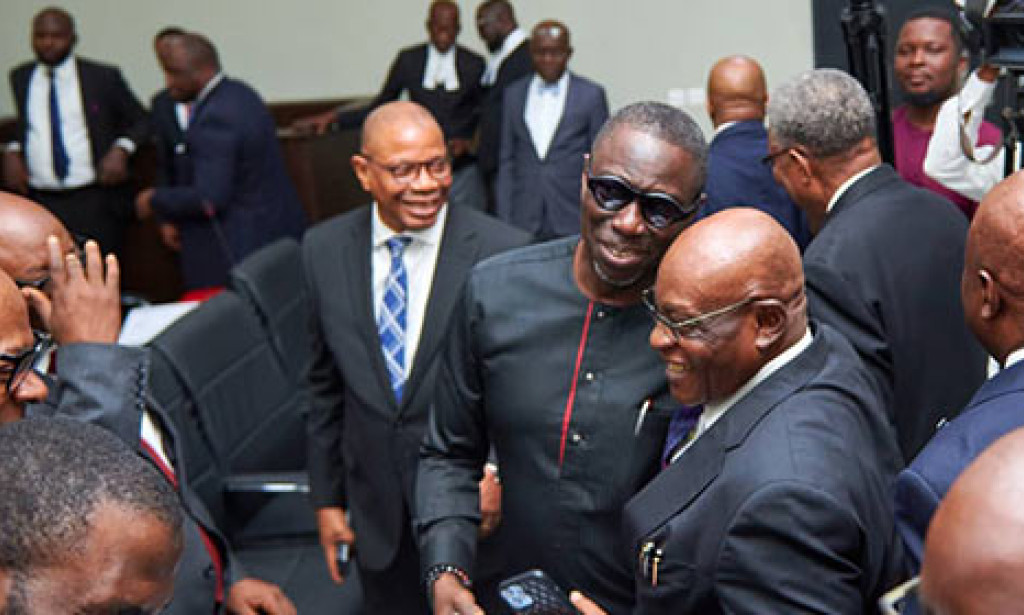1. Introduction
The integrity and impartiality of the judiciary are cornerstones of a just and equitable legal system. Public trust in the courts hinges on the perception that judges adhere strictly to the rule of law, free from any undue influence or personal bias. When questions arise regarding a judge's conduct, particularly in high-stakes cases, it is imperative to examine these concerns thoroughly to safeguard the sanctity of the judicial process. This report aims to analyse publicly available information and reported allegations pertaining to the judicial conduct of Justice Wilfred Kpochi, focusing on instances that raise questions about his impartiality and adherence to legal principles, which could potentially impact the credibility of his judgments. The analysis will encompass concerns emanating from the Edo State Governorship Election Tribunal, over which Justice Kpochi presided, and allegations of misconduct reported by Sahara Reporters in other cases involving the same judge. The significance of maintaining public confidence in the judiciary, especially in the resolution of politically sensitive election disputes, cannot be overstated. Perceived bias in judicial decisions can erode this confidence and exacerbate societal divisions, highlighting the importance of a meticulous examination of any claims that challenge a judge's integrity.
2. Background on Justice Wilfred Kpochi
Justice Wilfred I. Kpochi serves as a Judge at High Court 3 in Makurdi, Benue State. He was commissioned into this role on January 18, 2007, indicating a considerable tenure within the Nigerian judicial system. His long service suggests a wealth of experience in adjudicating legal matters. Beyond his regular duties at the High Court in Makurdi, Justice Kpochi has also been involved in politically sensitive cases. In 2023, he presided over a matter in Benue State concerning the national chairmanship of the Peoples Democratic Party (PDP), where he granted an interim order. This involvement in politically charged issues, even outside the domain of election tribunals, underscores the importance of scrutinizing his judicial conduct for any signs of partiality or impropriety.
3. Concerns Raised in the Edo State Governorship Election Tribunal
Justice Wilfred Kpochi held a central role as the Chairman of the Edo State Governorship Election Petition Tribunal, which was tasked with hearing the petition filed by Asue Ighodalo and the Peoples Democratic Party (PDP) challenging the victory of Monday Okpebholo in the gubernatorial election.The tribunal, under Justice Kpochi's leadership, reserved its judgment on March 3, 2025, after both parties had adopted their final written addresses, marking a significant stage in the resolution of the contentious electoral dispute. The PDP and its candidate, Asue Ighodalo, had approached the tribunal alleging that the election was marred by various irregularities, including over-voting, inaccurate computation of results, and non-serialization of electoral materials, and therefore sought the nullification of the declared results.
The three-member tribunal, with Justice Kpochi presiding, unanimously dismissed the petition, asserting that the petitioners had failed to provide sufficient evidence to substantiate their claims of over-voting and non-compliance with the Electoral Act in a substantial number of the challenged polling units.This verdict, however, was met with strong opposition from the PDP and its candidate. Asue Ighodalo, in a statement, declared the tribunal's judgment a "serious miscarriage of justice" and announced his intention to challenge the decision at the Court of Appeal. He emphasised that the pursuit of justice was aimed at protecting the collective rights of the Edo people to freely choose their leaders through credible elections. This decision to appeal underscores the deep dissatisfaction with the tribunal's ruling and raises questions about the thoroughness and impartiality of its assessment of the evidence presented.
A representative of the PDP publicly disagreed with the tribunal's findings, contending that the party had indeed presented credible evidence, including certified true copies of election results and witnesses, to support their allegations of electoral malpractices. The PDP also questioned the tribunal's focus on the number of witnesses presented, arguing that the quality and nature of the evidence, particularly the certified documentary evidence, should have been given more weight.They cited Supreme Court precedents to support their argument that the outcome of an election petition is not solely determined by the percentage of polling units challenged or the number of witnesses, but by the substantiation of the evidence presented.Furthermore, a PDP representative made serious accusations, alleging that the actual fraud occurred at the collation center due to wrong coalitions, and that the party had presented credible witnesses to testify to these irregularities.They further criticised the tribunal judges, including Justice Kpochi, for allegedly overstepping their bounds by introducing a case that was not originally pleaded by any of the parties involved, raising concerns about the tribunal's neutrality.
It is noteworthy that the same tribunal, under the chairmanship of Justice Kpochi, also dismissed another petition filed by the Accord Party against Governor Okpebholo, citing a lack of sufficient evidence for their claims of non-compliance and insufficient lawful votes. While the APC, through the governor, welcomed the tribunal's affirmation of their victory and called for cooperation, the strong dissenting voices from the PDP and their decision to pursue the matter further through the appellate courts indicate that the concerns surrounding the Edo State Governorship Election Tribunal's judgment, presided over by Justice Kpochi, are far from resolved.
4. Allegations of Misconduct and Abuse of Position: The Case of Sesugh Akume vs. Governor of Benue & Others (Based on Sahara Reporters Article)
Contrary to the user's initial reference to a case titled "Akile vs. Nyinya," the provided Sahara Reporters article details allegations of misconduct against Justice W.I. Kpochi in two distinct cases involving a Benue businessman, Sesugh Akume, and the Governor of Benue State. These cases are Sesugh Akume and Governor of Benue & Others (MHC/182/2019) and Sesugh Akume and Governor of Benue & Another (MHC/293/2020).
In the first case, MHC/182/2019, Justice Kpochi allegedly ruled in favor of governors appointing local government caretaker administrations, a decision that Sesugh Akume argued was in direct contradiction to the Nigerian Constitution and existing Supreme Court judgments.Furthermore, Justice Kpochi reportedly held that Akume lacked the legal standing (locus standi) to bring the case to court, despite Akume's legal team presenting recent Supreme Court authorities that they believed conferred the necessary right to sue. These allegations suggest a potential disregard for established legal precedents and a possible inclination to favor the executive arm of government.
The second case, MHC/293/2020, involves even more serious allegations. Justice Kpochi is accused of citing non-existent sections of the Benue Local Government Law to support his judgment in the matter. This accusation, if true, represents a severe breach of judicial conduct, implying either gross incompetence or a deliberate manipulation of the law. Additionally, Sesugh Akume alleged that Justice Kpochi engaged in unprofessional behavior by including personal insults directed at him within the judgment. Specifically, Akume claimed that Justice Kpochi referred to his efforts to achieve local government autonomy as a "waste of time" and labeled him a "gold digger," despite Akume not making any monetary claims in the case and the judge having no prior personal acquaintance with him.Such personal attacks within a judicial pronouncement raise serious concerns about Justice Kpochi's judicial temperament and impartiality.
Sesugh Akume reportedly submitted a petition to the National Judicial Council (NJC), the body responsible for disciplining erring judicial officers, outlining these allegations of misconduct against Justice Kpochi and another judge. The act of filing a petition with the NJC underscores the seriousness with which the Benue businessman viewed the alleged actions of Justice Kpochi.
|
Case Name |
Year |
Allegation 1 |
Allegation 2 |
Allegation 3 |
|
Sesugh Akume and Governor of Benue & Others (MHC/182/2019) |
2019 |
Ruled in favor of governors appointing caretaker administrations (allegedly contradicting Constitution and Supreme Court). |
Held Akume lacked locus standi (allegedly contradicting Supreme Court authorities). |
N/A |
|
Sesugh Akume and Governor of Benue & Another (MHC/293/2020) |
2020 |
Cited non-existent sections of Benue Local Government Law. |
Insulted Akume in judgment, calling his efforts a "waste of time." |
Labeled Akume a "gold digger" despite no monetary claims and no personal acquaintance. |
5. Analysis of the Allegations and
Their Relevance to Justice Kpochi's Credibility
The allegations emanating from the Sesugh Akume cases, if substantiated, have significant implications for assessing Justice Kpochi's overall judicial credibility, particularly in the context of his role as Chairman of the Edo State Governorship Election Tribunal. The claim that Justice Kpochi disregarded constitutional principles and Supreme Court precedents in the MHC/182/2019 case raises serious questions about his commitment to upholding the foundational legal framework of Nigeria. If a judge is perceived to deviate from established legal hierarchies in one instance, it naturally casts doubt on their adherence to these principles in other sensitive matters, such as election petitions where strict adherence to the Electoral Act and constitutional provisions is paramount.
The accusation of citing non-existent laws in the MHC/293/2020 case is particularly alarming. The integrity of judicial pronouncements relies heavily on the accurate application of existing legal statutes. Citing laws that do not exist suggests either a profound lack of diligence or, more troublingly, a deliberate attempt to manipulate the legal basis for a judgment. Such an action would fundamentally undermine the trustworthiness of any ruling issued by Justice Kpochi.
Furthermore, the alleged personal insults directed at Sesugh Akume within the judgment in MHC/293/2020 point to a potential lack of judicial temperament. Judges are expected to maintain neutrality and professionalism in their pronouncements, refraining from personal opinions or attacks. The reported use of disparaging language raises concerns about whether Justice Kpochi allows personal biases or animosities to influence his judicial decision-making process. This is particularly relevant when considering his role in the highly politicized Edo State Governorship Election Tribunal, where impartiality is crucial for public acceptance of the outcome.
The fact that Sesugh Akume reportedly filed a petition with the National Judicial Council (NJC) regarding these allegations underscores their seriousness. While the outcome of this petition is not available within the provided materials, the very act of lodging a formal complaint with the body responsible for judicial discipline indicates that the alleged misconduct was considered significant enough to warrant official review. This adds further weight to the concerns surrounding Justice Kpochi's judicial conduct.
While the Sesugh Akume cases occurred within the Benue State judicial system and involved different legal issues than the Edo State Governorship Election Tribunal, the nature of the allegations – potential disregard for legal principles, fabrication of legal basis, and personal bias – are fundamental to the integrity of any judicial officer. These allegations, therefore, cannot be dismissed as isolated incidents unrelated to Justice Kpochi's role in the Edo tribunal. Instead, they contribute to a broader pattern of concerns regarding his approach to the law and his conduct on the bench.
6. Conclusion
The examination of reported allegations concerning Justice Wilfred Kpochi reveals a pattern of concerns that warrant careful consideration. His role as Chairman of the Edo State Governorship Election Tribunal, a case of significant public and political interest, has already drawn criticism from the petitioners who have vowed to appeal the tribunal's decision, citing a "serious miscarriage of justice." These concerns are further amplified by the serious allegations of misconduct and abuse of position arising from the Sesugh Akume cases in Benue State. These allegations include the potential disregard for constitutional principles and Supreme Court precedents, the alleged citation of non-existent laws, and unprofessional personal attacks within a judgment. While these allegations pertain to different legal contexts, they collectively raise significant questions about Justice Kpochi's impartiality, adherence to legal principles, and judicial temperament. The reported petition to the National Judicial Council further underscores the gravity of these concerns. In light of Justice Kpochi's involvement in politically sensitive cases, both in Benue State and as the head of the Edo State Governorship Election Tribunal, these cumulative concerns necessitate careful scrutiny and potentially further investigation to ensure the integrity of the judicial process and maintain public trust in the administration of justice.



You must be logged in to post a comment.